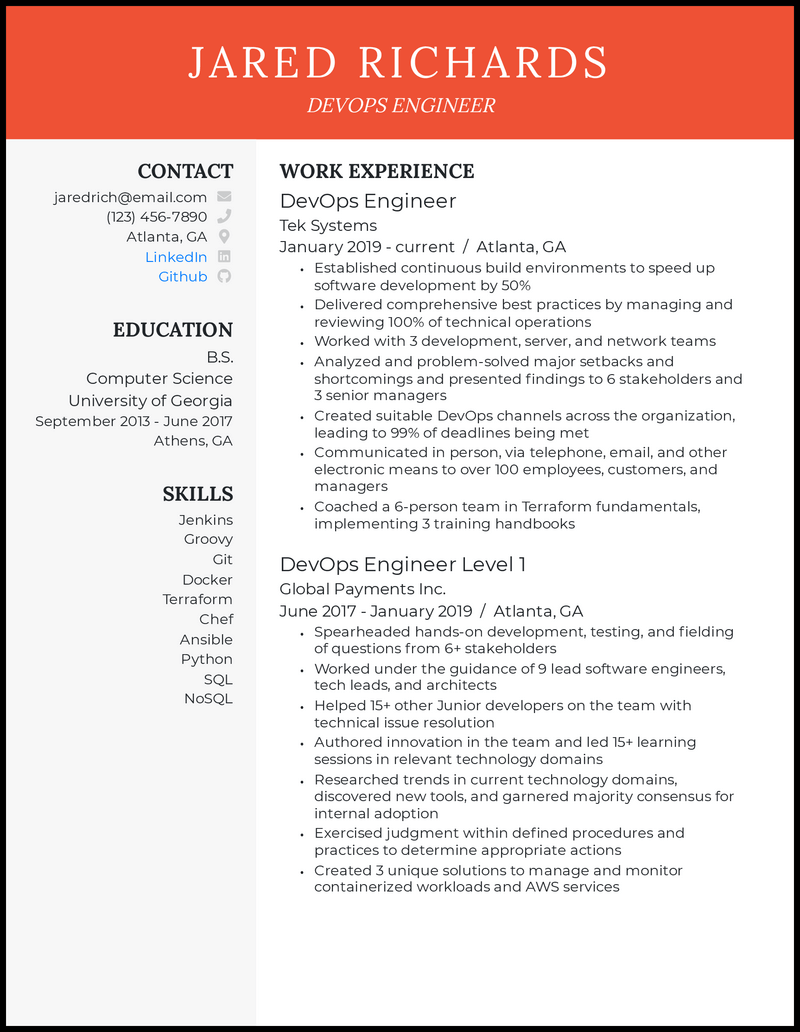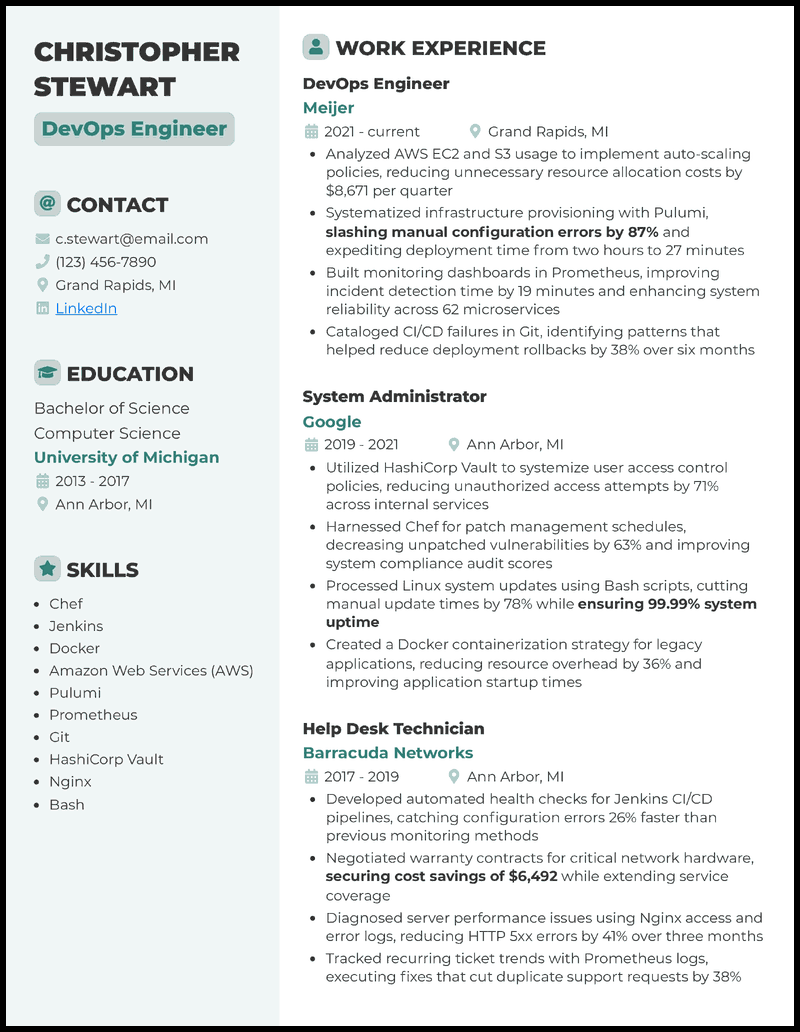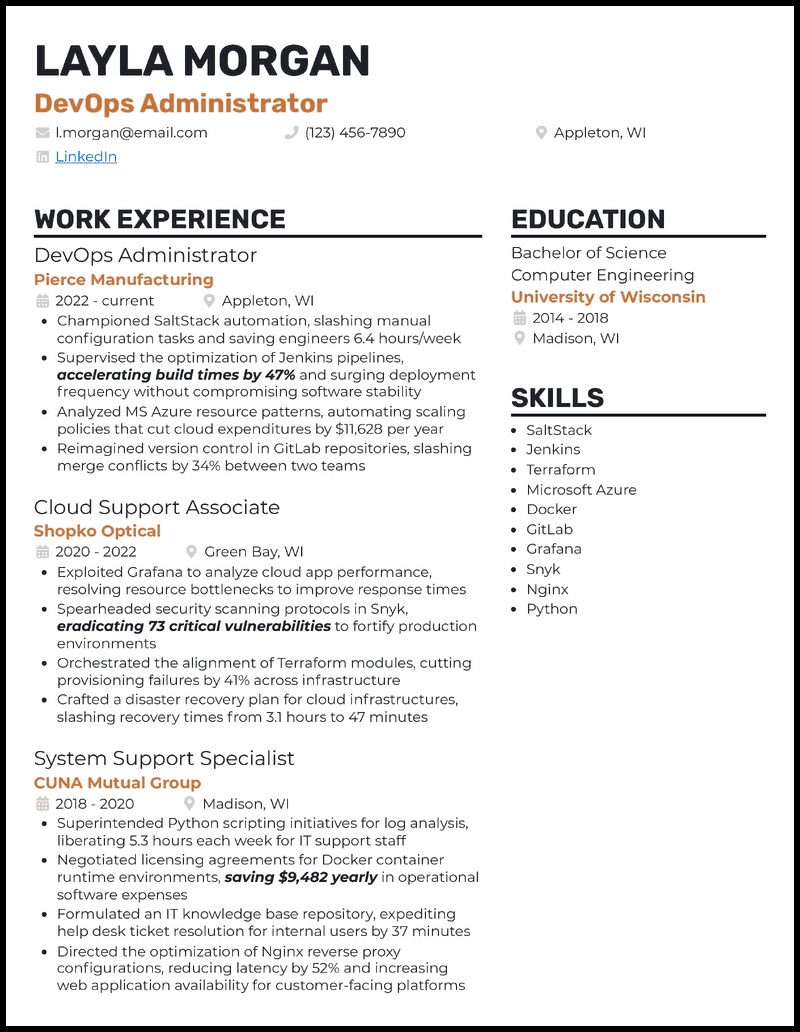Staring at a blank page when trying to make a cover letter or create a resume can be demoralizing. These 18 DevOps resume templates are designed to help you get started writing a resume that will help you land interviews for your next (or first) DevOps role in 2026.
The hardest part is getting started. These resumes have helped engineers get interviews at companies like Stripe and Dropbox, so they’re a great place to start.
Seal experience gaps
- Recent graduates can (and should) take advantage of all their university projects to highlight that they’re all set to take on a real-world job.
- To convince employers, include basic DevOps tasks like identifying and fixing code errors, creating automation scripts, improving the performance efficiency of infrastructure, etc.
- While not necessarily mandatory, check your resume to see if you can add more of your technical expertise like managing backend code or creating shell scripts that help your peers monitor systems.
Conquer the ATS
- Many companies today use an Application Tracking System to curate applications before a recruiter see the resumes.
- To reach the hiring manager, your resume must hit the right cords with the ATS. Keywords from the job description like Amazon Web Services, develop CI/CD pipelines, Kubernetes autoscaling, etc. are you best ally. Each job is unique and will contain different keywords, so it’s best to read carefully before applying.
- Also, keep visual aesthetics at a minimum. This means no fancy graphs, charts, or acronyms.
View more more azure devops resumes >
Match the expectations
- Sticking to the job description is always a good idea. Don’t include generic sentences that don’t give employers a reason to choose you over other candidates.
- If you’re aiming for a lead position, then go through all the responsibilities listed like providing guidance to DevOps engineers and making sure the company’s infrastructure is compliant with current regulations.
- Next, craft your bullet points accordingly to show how you can handle these duties. Pro tip: Use direct keywords like Managed X DevOps engineers or Revamped the company’s existing policy.
View more AWS DevOps resumes >
Show relevant skills
- You have only a few seconds to grab the potential employer’s attention. How about capitalizing on a career objective to get them hooked on the rest of your DevOps intern resume so they can see how your goals align?
- Aim for 2-3 sentences when crafting your career objective statement, and ensure it showcases relevant skills and experiences based on what the job ad says. Since you want it to be among the first things recruiters see, put it right at the top of your resume, just below the header.
Leverage a career objective
- Be strategic about when you write a resume objective or summary.
- A career objective is more suited for graduates who are still newcomers and applying for entry-level DevOps roles. Ideally, you want to talk about your passion for being a DevOps engineer and your overall goals at the new company.
- A career summary on the other hand is best for those who’ve spent long years in DevOps. It should include the greatest achievements throughout your career and how you aim to grow even more at a new workplace.
Leverage past wins
- Think about it: A good chunk of the 200+ hopefuls who threw themselves into this mix are new to the game. Then, there’s you; you’ve been in the game for a while. Now, about standing out in the portion that actually has a shot at getting an interview, try calling attention to your wins in a similar role in your DevOps SRE resume.
- So, when it’s time to compose your work history, lead with your stint as a DevOps SRE and toot your own horn. Talk about those good days when you streamlined software updates by automating deployment pipelines with Jenkins and reduced deployment times by over 30 minutes.
Pitch your value
- Getting recruiters on your side boils down to whether you can validate your claim that you’re pure gold. At a loss for ideas to do that? Here’s one that could change your fate—demonstrate your impact and value by adding metrics to your DevOps architect resume.
- Nathan plays it smart by capitalizing on phrases like “…reducing manual setup time by 43%”, “…ensuring a 36% dip in deployment variability and errors”, and “Utilized Jira to manage 106 daily tasks and track progress along cross-functional project timelines.”
Show successful leadership
- A job-winning DevOps chef resume showcases your leadership skills, making it clear to potential employers that their department would be in capable hands with you. To hit the mark, accent moments in your career when your decisions truly made a difference.
- Take Christopher, for example. He openly shares his success with rolling out a Docker containerization strategy for legacy applications. The outcome? He slashed resource overhead by a hefty 36% and boosted application startup times noticeably.
Demonstrate technical ability
- Yes, there are a couple of ways to win over the hiring manager and convince them you’re the best person for the job. One of our favorites is communicating relevant technical abilities in your DevOps administrator resume.
- Showcasing your proficiency in job-relevant software (cue Jenkins, Docker, and Python) tells the potential employer that you’re armed and ready to tackle any relevant project they throw your way. Talk about optimizing Jenkins pipelines, speeding up build times, mastering cloud infrastructure, and the like. Because, honestly, what better way is there to prove you can bring real value to the team?
Sharing references
- One of the best resume tips we can provide is adding references. Whether it be your university professor or a past employer, get in touch and see if they’re willing to help.
- The best way to go about this is by using references that have seen your ability to manage teams, oversee infrastructure, and use containerization and version control tools.
- An outsider’s perspective helps hiring managers judge your personality and how well you can fit into the role.
View more kubernetes resumes >
Resume layout matters
- Do you know how many lifeless Salesforce DevOps resumes Nathan, the hiring manager, has seen in the past few days? It’s more than you can shake a stick at. Catch them off-guard by choosing a resume format that is so interesting they’ll have no option but to add your piece to the “stand-out” pile.
- A two-column layout with clear sections, classic and legible fonts (read Calibri, Cambria, Garamond, etc.), snappy bullet lists for your work history, and a pop of color accentuating parts such as your job title are the makings of a visually appealing resume. Using larger fonts for subheadings is also an excellent idea.
Please the ATS
- We get that as a new relic DevOps engineer, knocking the recruiter’s socks off is on the front burner. Don’t be tempted to add your picture to your resume to do that, though; it’s more trouble than it’s worth.
- While your photograph could enhance the visual appeal of your new relic DevOps resume, it might also compromise your privacy (and security). Therefore, it is best to keep your photograph out of your piece; you are not a model or actor, after all. Besides, it prevents recruitment bias based on your looks, which is more prevalent than you think.
Paint your career journey
- Not everyone starts out as a DevOps engineer or lead and that’s completely fine. What’s not fine is confusing employers by not connecting your past roles with the current on.
- Don’t be hesitant to include other roles such as a software developer or system administrator. Even if they’re not entirely the same as those in DevOps, they include similar duties like automating monotonous tasks and maintaining system security.
- Remember to highlight work experience bullet points that are most relevant to the job you’re applying to.
View more senior DevOps engineer resumes >
Deploy certificates
- No matter what level of DevOps position you’re applying to, certificates will always come in handy. If you’ve got a bunch of tech-based ones, we recommend including only those relevant to the role.
- In this case, using certificates like AWS Certified DevOps Engineer, Certified Kubernetes Administrator, Puppet Certified Professional, and Certified Jenkins Engineer will be most helpful.
- These certs don’t go for sale like candy and employers understand that getting one takes practice and cracking tough exams.
Graphics are bad idea
- You’ve probably heard recruiters task the applicant tracking system (ATS) with sifting through applications. Take our advice and ignore the little voice inside your head telling you to add an image or any other graphics to your DevOps CI/CD resume—that move could backfire on you.
- Although graphics add personality and visual interest to your masterpiece, they don’t play nicely with ATS bots. That makes including them a bad idea (unless you’re not keen on getting the recruiter’s attention or beating the competition).
Going for brevity
- We know, there’s probably a lot you want to let employers know—from being proficient in tools like Jenkins and AWS to how your management skills ensured team members followed the best practices.
- But here’s the deal, you don’t want to go overboard. Instead of writing a long list of work experience bullet points, use only four points for each job.
- Using pre-built templates can help you design a concise resume that employers can easily scan and decide in your favor.
View more lead DevOps engineer resumes >
Flaunt technical expertise
- When all is said and done, what you bring to the table makes a huge difference in how a hiring manager perceives you. That’s how we know accentuating relevant technical expertise in your Cloud DevOps engineer resume can see you rise above the pack.
- Of course, adding a tool like Kubernetes to your skills section won’t cut it; go out of your way and illustrate how you applied it at work to show the hiring manager you’re not the kind who bluffs to get what they want.
Show skills with value
- There are two technical skills that you cannot afford to forget to add to a DevOps resume—AWS and Kubernetes.
- You don’t have to be an expert at both, but they help you convey that you’ve got what it takes to automate processes in daily operations and manage the latest infrastructure.
- Don’t stop at listing them in your resume’s skill section. Write about how you’ve encouraged team engineers to implement best practices on AWS or your contribution to helping developers fix broken deployments on Kubernetes.
Related resume guides
How to Write a DevOps Resume

When recruiters review your application, they’re looking for specific skills, experience, and a candidate who fits the job description. So, when you write your resume, ensure that you include keywords from the job ad to optimize it for applicant tracking systems (ATS) and be in sync with what industry experts would be fond of.
Here, we breakdown the steps of writing an effective DevOps resume that gets you notices by employers.

Set a professional tone with a header
Your name, job title, and contact information should be visible the moment a recruiter sets eyes on your application. The name, typically first and last names, should be the most prominent in a larger font size than the rest of the sections. Right below it add the title of the role you’re applying for.
What follows is a professional email, phone number, city, state, and LinkedIn and GitHub profile links if they’re relevant to the open position.
Example of a header for a senior DevOps Engineer resume


Resume objective or career summary?
Decide if you’ll include a resume objective or career summary. They’re good options if you take the time to tailor them to the specific role. In an objective, you can speak to past engineering and infrastructure responsibilities that will equip you to begin a career in DevOps. With a resume summary, you can quickly highlight the real value and job success you’ve brought to past DevOps roles.
Example of career objective for a DevOps internship
“Recent graduate with practical tech support and web development experience, aiming for a DevOps internship at Kipsu. I plan to use troubleshooting skills, web tech knowledge, and data visualization insights to boost Kipsu’s operational efficiency and deployment reliability.”
Example of summary statement for DevOps with experience
“DevOps engineer with 10 years of experience managing infrastructure for applications with millions of users. I have helped save over $1.75M by reducing infrastructure costs while improving performance. I am looking to apply that same drive at a successful company like Google.”

Choose an effective resume format
Format your resume so that you share your most recent, most experienced role first. If you began your career path in software development, that should be at the bottom of your resume. The top of your resume is what hiring managers see first, so right away, list your most experienced role so that they can quickly see your abilities as a manager in a technical team environment, a leader and expert in the application of principles, and deliverer when it comes to project completion and improvement.

Show impact in your experience
From previous work experiences, projects, and internships, show what you’ve accomplished and the impact. Here, you should pair your skills with active words in bullet points that spell out your value. It’s important that you remain realistic in your use of metrics so that your achievements don’t come across as exaggerated.
Example of work experience that shows impact
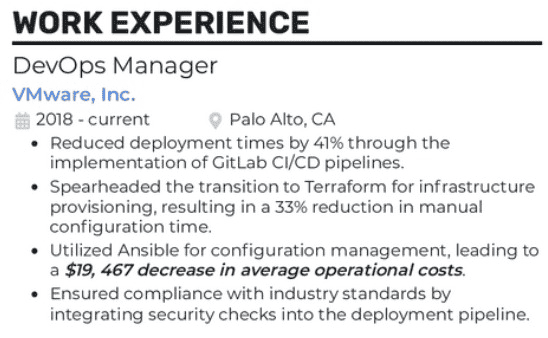
Lead with active verbs that show ownership and autonomy in your projects
Use DevOps-specific verbiage to propel your job experience bullet points forward. Some examples include:
- Managed
- Developed
- Improved
- Collaborated
- Implemented
- Created
- Built
- Delivered
- Mentored
- Coached
- Engineered
- Automated
- Diagnosed

Highlighting DevOps skills
Check the DevOps job listing because there are a zillionskills you could include—but probably shouldn’t! No matter how great of a DevOps engineer you are, you simply can’t know every technology, scripting language, CI/CD toolset, automation servers, container management tools, etc.
Let’s say a company lists different source code management tools you should have in your wheelhouse, mentioning things like Python, Bamboo, Ansible, and Jenkins. You may only be casually familiar with Bamboo, but Python, Ansible, and Jenkins—now, you’ve got some years of experience with that! Those are the kind of skills you want to add to your DevOps resume in the age of skills-based hiring.

Include Education and any necessary DevOps certifications
For experienced DevOps professionals, education should take a lesser prominent position on your resume. However, for graduates who lack real-world job experience, you can use your educational background to add weight to your application. When listing education, start with the most recent level and include the school’s name, location, and year of graduation.
How to list education
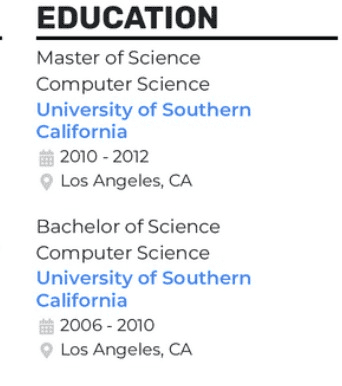
While one job may require you to be a Certified Kubernetes Administrator (CKA), another job ad may not require any certification. This is why it’s so important to tailor your resume to the job description. Don’t miss out on an interview and potentially the job itself just because you failed to mention your Jenkins certification.
Remember that some certs expire, such as a security certification like HashiCorp Certified: Vault Associate. Be sure to keep on top of those details, so you remain up to date and can seamlessly transition into the job.
Great examples of DevOps certifications
- Certified Kubernetes Administrator (CKA)
- Red Hat Certified Engineer (RHCE) in DevOps
- Google Cloud Professional DevOps Engineer
- CompTIA Security+
DevOPs Resume FAQs

To write a good DevOps resume, tailor it to the role by using keywords such as CI/CD, Docker, AWS, and Kubernetes from the job description. You should also demonstrate mastery of tools such as GitLab CI, Terraform, and Ansible while quantifying achievements by using metrics to show impact.
For a winning DevOps manager resume, show your leadership through managing teams and mentoring juniors and emphasize your role in aligning the business to stakeholders’ expectations. It’s also crucial to showcase quantified achievements in Uptime improvement and mean time to recovery through change management and Lean transformations.
A good DevOps resume summary should be:
✅ Concise (2-3 lines)
✅ Quantified
✅ Skills-rich
✅ Impactful
✅ Role-specific
Example (Senior DevOps Engineer)
Results-oriented DevOps Engineer with 7 years of experience automating cloud infrastructure on AWS and Azure. Reduced deployment time by 63% using CI/CD pipelines with Jenkins and Terraform. Proficient in Terraform, Docker, GitLab CI, and AWS with a strong focus on DevSecOps and SRE practices.
If you’re a new graduate, use every university project/internship to your advantage. Make sure you include and highlight bullet points that clearly show your involvement in building CI/CD pipelines and containerizing software using popular tools, such as Kubernetes and Docker.




